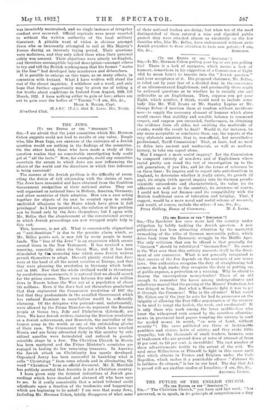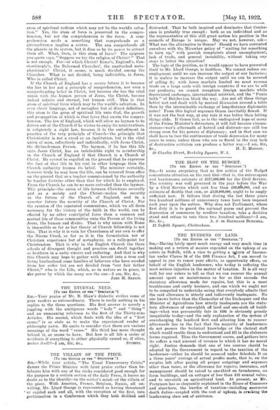THE FUTURE OF THE ENGLISH CHURCH.
[TO THE EDITOR OF THE " SPECTATOR.")
SIR,—" The Christian Church," you have said last week, " has . Preserved, so to speak, in its principle of comprehension a tiny
atom of spiritual radium which may yet be the world's salva- tion." Yes, the atom of force is preserved in the compre- hension, but not the comprehension is the force. A com- prehension needs a something that comprehends as a circumference implies a centre. The sun comprehends all the planets in its system, but it does so by its power to attract them all. What, then, is this atom of force? The epigram you quote says, " Suppose we try the religion of Christ? " That is not enough. For—of which Christ? Rome's, England's, Con- stantinople's, the Reformed Churches', the unattached meta- physician's? Christ, it seems, is much divided among the Churches. What is not divided, being indivisible, is Jesus, Who is called Christ.
If the Church of England has a secure future it is because she has in her not a principle of comprehension, nor even a comprehending belief in Christ, but because she has the vital union with the human person of Jesus, the Christ, become indeed infinite and eternal, but human still. This is that atom of spiritual force which may be the world's salvation. In even closer language, not of metaphor but of direct definition, this atom is the germ of spiritual life unto God, the growth and propagation of which is that force that exerts the compre- hension. The law of England, which will allow no layman to be driven out of the Church if he wishes to enjoy its ministrations, is religiously a right law, because it is the embodiment in practice of the very principle of Church—the principle that Christianity is not a creed or an institution, but is the vital union of man, collectively and individually, with Jesus Christ, the divine-human Person. The layman, if he has this life unto Jesus Christ, has an indefectible right to membership in the Church of England if that Church is a Church of Christ. He cannot be expelled on the ground that he expresses the fact of that life in his soul in other language than the Church authority frames its belief. The minister certainly, however truly he may have the life, can be removed from office on the ground that as a teacher commissioned by the authority he teaches doctrine other than that for which he is employed. From the Church he can be no more extruded than the layman. This principle—the union of life between Christians severally and as a society and the Christ—makes the security in the future of the Church of England, and in a remoter future the security of the Church of Christ. For the reunion of the separated communions, which we all deem necessary for the victory of the faith in the world, can be effected by no other centripetal force than a common and mutual life of these communities unto the Person of the living Jesus, the human and divine. That is why union with Rome is impassible so far as her theory of Church fellowship is not this. That is why it is vain for Churchmen of our own to offer the Nicene Creed, so far as it is the formulation not of Christian experience but of metaphysic, as a rally-point for Christendom. That is why in the English Church the three schools of divergent thought and practice can dwell together as brethren in a unity sincere and enduring. And that is why this Church may hope to gather with herself into a true and living brotherhood some families of believers who have seceded from her order but are not divided from "our fair father Christ," who is the Life, which, as in- nature so in grace, is the power by which the many are the one.—I am, Sir, &c., JOHN H. SHRINE.



































 Previous page
Previous page